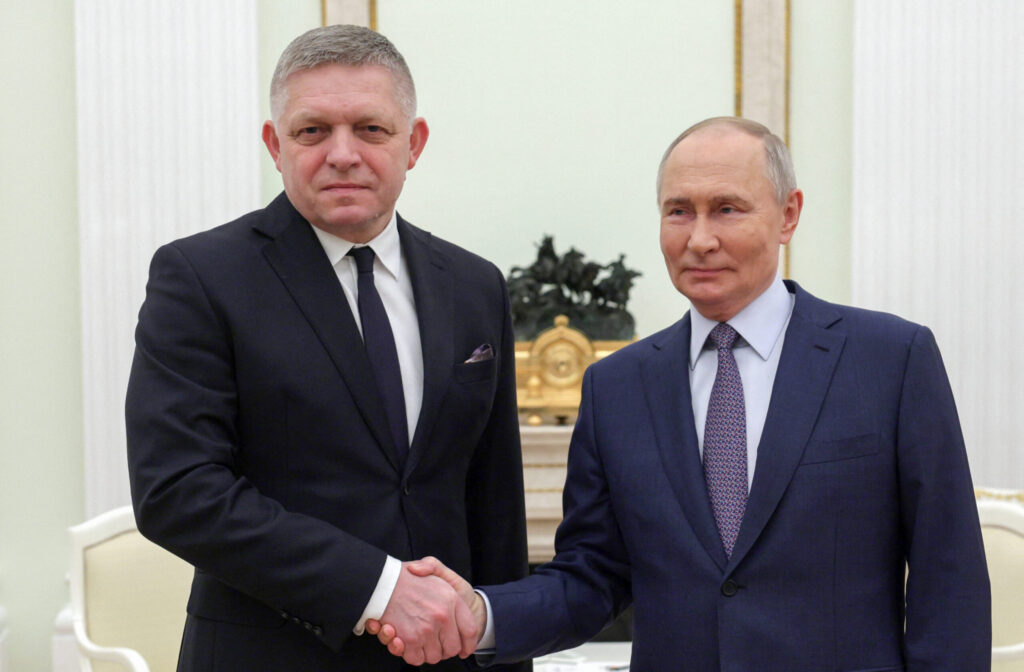Brussels – Something seems to be moving in Bratislava, where the opposition parties are trying to join forces to send pro-Russian Prime Minister Robert Fico home. As they seek to unseat him, they may get the crucial help of a handful of deputies from the ruling majority, which in recent months seems crippled by internal disagreements within the coalition parties.
During an unprecedented joint press conference yesterday (Jan. 14), leaders of major Slovak opposition parties announced that they would coordinate to put an end to the government of Robert Fico, already premier twice (2006 to 2010 and 2012 to 2018) at the helm of SMER, a left-wing populist party suspended from the Party of European Socialists in October 2023 for its pro-Russian positions and for having formed a coalition executive with the right-wing nationalist Slovak National Party (SNS).
Towards Moscow with fury
The most significant concern of opposition parties is the prime minister’s carefree foreign policy: Under his leadership, they say, Bratislava is moving too close to Moscow and away from traditional Euro-Atlantic alliances.
Fico has repeatedly questioned military support for Ukraine, suspended sending arms to the former Soviet republic, announced the Slovakian veto to Kyiv’s entry into the EU and NATO, and, most importantly and surprisingly, went to the Kremlin to meet Russian President Vladimir Putin, sparking a quagmire of controversy both at home and in Brussels.

During his controversial pre-Christmas visit, the Slovak premier tried to secure the flow of cheap Russian gas to his country after the suspension of transit via Ukraine, offering to host future peace talks between Putin and the next US President, Donald Trump, (a candidacy later emulated by Berne and Belgrade).
No-confidence vote
So, yesterday afternoon, the parliamentary oppositions (PS, SaS, and KDH) invited the extra-parliamentary Sdkú-Ds movement and the SLOVENSKO party (formerly known as Ol’ano), led by the controversial former premier Igor Matovič, to join forces to dethrone the premier and put the country back on a solidly pro-Western political course.
The step-up should come through a motion of no-confidence in the government to be submitted to the Chamber at the earliest opportunity, which could already be on January 21. Fico said he would personally attend the extraordinary session and ensure that deputies of the ruling coalition are present so that the quorum for the vote is reached.
The leader of the opposition in the House, Michal Šimečka (PS), stressed the need for the parties involved, whose political platforms are decidedly heterogeneous, to send a message of unity against the premier, who “flies around the world, bows to dictators, enjoys luxury somewhere in Vietnam, insults our neighbors and partners.”
The reference to dictators evidently relates to the meeting with Putin, while the one to Vietnam relates to an alleged stay by Fico in a luxury hotel in the Asian country while at home, the population grapples with the exploding cost of living and the crisis of the healthcare system. Even Branislav Gröhling (SaS) reiterated that anti-Fico forces must align to “save Slovakia”.
Today, the entire opposition united to take action against the government of Robert Fico. There are many differences between us, both in opinion and in policy style, but when it comes to defending democracy and freedom in Slovakia, we can work together. We agreed on two fundamental points: pic.twitter.com/mMp3CL3Nis
– Michal Šimečka (@MSimecka) January 14, 2025
The numbers in the Chamber
In Slovakia’s single-chamber parliament, the opposition holds 71 of the total 150 seats, but a censure of the government will require at least 76 votes. However, given the disagreements within the governing coalition, some majority MPs may slip out and vote against their executive.
In recent months, the parliamentary groups of the SMER, HLAS, and SNS partners did not give their support on several occasions, paralyzed by internal disagreements due, among other things, to growing impatience with the premier’s pro-Russian tendencies. Some deputies have publicly distanced themselves from Fico’s trip to Moscow while simultaneously announcing that they would travel to Kyiv to express solidarity with the Ukrainian people.
In this context, on January 12, Fico gave an ultimatum to his allies, threatening early elections or, as an alternative, a government reshuffle if the internal issues are not resolved by March.
English version by the Translation Service of Withub






![Un campo coltivato [foto: imagoeconomica]](https://www.eunews.it/wp-content/uploads/2025/04/campo-coltivato-120x86.png)
![[foto: Wikimedia Commons]](https://www.eunews.it/wp-content/uploads/2025/04/alzheimer-120x86.png)